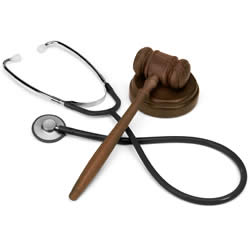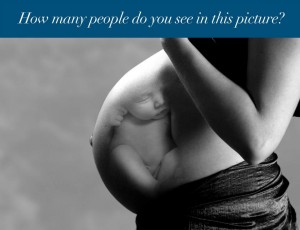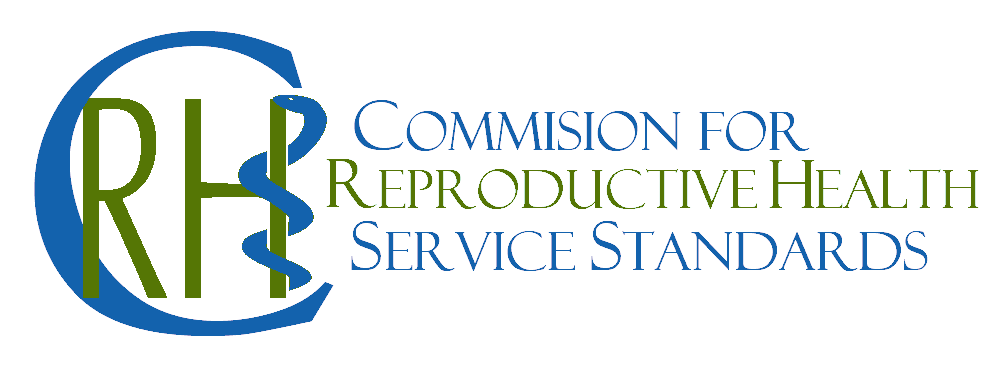 Barack Obama in an April 15th interview with the Today Show when asked about the Philadelphia murder trial of abortionist Kermit Gosnell said, “If an individual carrying out an abortion, operating a clinic, or doing anything else is violating medical ethics, violating the law, then they should be prosecuted.”
Barack Obama in an April 15th interview with the Today Show when asked about the Philadelphia murder trial of abortionist Kermit Gosnell said, “If an individual carrying out an abortion, operating a clinic, or doing anything else is violating medical ethics, violating the law, then they should be prosecuted.”

The President makes an interesting point regarding ‘violating medical ethics,’ assuming that the violation of which is a violation of the law. What, I wonder, would his President’s Commission on the Study of Bioethical Issues have to say about medial ethics in the context of abortion or reproductive health services? We could ask Chairwoman Amy Gutmann, a political scientist serving as President of University of Pennsylvania, Philadelphia just minutes from Gosnell’s ‘House of Horrors’ but ironically her expertise is not medicine nor medical ethics.
The question that must be answered is, “What is medical ethics?” A profession like medicine has its own ethic largely because of the power disparity and the potential for abuse between the doctor and the patient. The doctor has the means to help a patient to maintain or regain his or her lost physical autonomy due to injury or sickness. The patient must have absolute trust that the doctor will act in the patient’s best interest rather than his own. Given the squalid conditions of Gosnell’s clinic and the atrocities apparently committed upon women and babies as well as his million dollar annual personal income it appears that Gosnell was not acting in the best interest of the patient. But the public might ask, “Are any abortionists acting in the best interest of the patient?” Could the reason why the media has failed to provide adequate coverage of the trial be that the answer is no?
 Up until 1973 western American medicine was based on the Hippocratic tradition. Dr. Leon Kaas, former member of the President’s Council on Bioethics, fully translated the Hippocratic Oath to which most physicians pledged upon graduation from medical school. One curious phrase in that oath reads, ” I will not give to a woman an abortive remedy.” You see the problem? The Supreme Court case Roe v Wade did not just pave the way for abortion on demand but struck at the very heart of traditional medical ethics. So now President Obama refers to medical ethics both on the Today Show as well as when he was an Illinois State Senator ironically using it as a reason to reject a measure to provide medical care to infants born alive during abortion procedures.
Up until 1973 western American medicine was based on the Hippocratic tradition. Dr. Leon Kaas, former member of the President’s Council on Bioethics, fully translated the Hippocratic Oath to which most physicians pledged upon graduation from medical school. One curious phrase in that oath reads, ” I will not give to a woman an abortive remedy.” You see the problem? The Supreme Court case Roe v Wade did not just pave the way for abortion on demand but struck at the very heart of traditional medical ethics. So now President Obama refers to medical ethics both on the Today Show as well as when he was an Illinois State Senator ironically using it as a reason to reject a measure to provide medical care to infants born alive during abortion procedures.
If appropriate professional conduct in the context of abortion is dictated by medical ethics then how are ethics

defined in a post-Roe, post-Hippocratic America? For a doctor to practice medicine he must have patients. For a patient to trust her life in the hands of the doctor she must believe that he will act first and foremost in her best interest. When doctors fail to do so it not only fails to respect the autonomy of the individual patient but also the sacred trust the people place in the medical community. Without that trust a clinician cannot get the information needed from a patient for proper diagnosis and treatment. Without individual patients trusting that the medical profession will consistently manage their individual care without fraud, abuse and neglect, the medical profession will be abandoned, left UN-patronized even if it is socialized. This is part of the problem with population medicine and the implementation of Obamacare, the physician is made to consider first the interests of the state’s objectives for a population and then secondarily the interests of his immediate patient. The foreseeable certainly of this circumstance will at least hollow out the trust a community places in the medicine.
This is also why Gosnell and the issue of medical ethics are so important to the national abortion conversation. If medicine is to continue to serve humanity it must continue to maintain that sacred trust, that it will seek the best for the patient at the knee first without violating the dignity of all humanity in the process. The good of the patient does not equate to the shallow ‘vending machine’ notions born from an anemic abortion industry’s notions of patient autonomy cleverly labeled ‘choice.’ This is especially true if the perceived good of the patient involves the demise of another patient (as in abortion). The ham-handed political solution to the ethical dilemma of unplanned pregnancy is to simply rule by fiat that the baby is not a person and therefore is only a patient in the event the mother’s sentiment toward the child is positive. Unfortunately even Supreme Court Justices cannot change human biology.
 To maintain credibility in the broader community medicine must refrain from discriminating against certain patients based on obvious factors such as financial status, race, religion, ‘sexual orientation,’ physical condition, or stage of maturity. It is important to note here that the abortion industry is based on precisely this sense of maturity discrimination. This means that humans in the pre-birth stages of development do not qualify as human deserving of medical treatment therefore abortion does not equate to violating the principle of at least ‘doing no harm.’ Abortion in this ethical sense undermines the practice of medicine and by default makes abortionists at best non-medical (neither healing nor maintaining health) for either the mother’s healthy functioning reproductive system or the baby. At worst, the personhood of the child aside, abortion reflects an ongoing undisclosed financial conflict of interest whereby the abortionist has a vested interest in the woman choosing to abort based on coercive circumstances while masquerading as an ethical physician.
To maintain credibility in the broader community medicine must refrain from discriminating against certain patients based on obvious factors such as financial status, race, religion, ‘sexual orientation,’ physical condition, or stage of maturity. It is important to note here that the abortion industry is based on precisely this sense of maturity discrimination. This means that humans in the pre-birth stages of development do not qualify as human deserving of medical treatment therefore abortion does not equate to violating the principle of at least ‘doing no harm.’ Abortion in this ethical sense undermines the practice of medicine and by default makes abortionists at best non-medical (neither healing nor maintaining health) for either the mother’s healthy functioning reproductive system or the baby. At worst, the personhood of the child aside, abortion reflects an ongoing undisclosed financial conflict of interest whereby the abortionist has a vested interest in the woman choosing to abort based on coercive circumstances while masquerading as an ethical physician.
Hippocratic medicine and traditional Ob/Gyn physicians implicitly understand that a pregnant woman represents two patients and to neglect one is to demean not only the dignity of the mother and the personhood of the child but also to ignore the inviolability of all humanity while allowing medicine to fall into disrepute in the minds eye of the population it claims to serve. If medicine does not protect and serve all people, wherever they happen to be in the human experience, then medical ethics and attendant physician conduct are vacuous notions with accountability as unpredictable as what the mainstream media might consider newsworthy.
two patients and to neglect one is to demean not only the dignity of the mother and the personhood of the child but also to ignore the inviolability of all humanity while allowing medicine to fall into disrepute in the minds eye of the population it claims to serve. If medicine does not protect and serve all people, wherever they happen to be in the human experience, then medical ethics and attendant physician conduct are vacuous notions with accountability as unpredictable as what the mainstream media might consider newsworthy.
It is not coincidence that the National Abortion Federation in the introduction to their 2011 document entitled Ethical Principles for Abortion Care asserted that, “This document [ethical principles] will be adjusted to reflect current thinking on a range of issues.” Why does abortion require fluid ethics? Because fluid ethics are no ethics at all. For abortion to exist within the bounds of medicine, medical ethics must be relativistic, watered-down, made virtually meaningless. But where does medicine begin for the baby? If medical ethics are permitted to allow someone (e.g. the Supreme Court) to distinguish some humans as human and others humans as non-human then medicine’s objective to heal is compromised. That moment is the crest of the cold, calculating, and somehow logical slippery slope. If we can arbitrarily assign criteria of when a human is a person then the question of when a baby becomes a person deserving of medical care slips past the cervix, out onto the delivery table crying lonely solidarity, its undeniable humanity and we cruelly ponder . . . is it human? By then the noble human moment of protecting the vulnerable has past and the concept of medical ethics has already become fluid and the definition of human is limited to government approved categories . . . and with Orwellian newspeak the President proudly proclaims, “If an individual carrying out an abortion . . . is violating medical ethics . . . .”
Obama sublimely captured the heart of why Gosnell is and should be front and center: Medicine is in moral crisis because America is in a moral crisis. If medical ethics are fluid then there was nothing for Gosnell to violate and we should let him go free. Or if he did violate medical ethics then perhaps what Obama, the NAF, and Planned Parenthood are suggesting is that it is time to ‘adjust them?’ And now aren’t we are squinting, blinded by the bold faced, horrible new world where medicine is no longer life but death?
Lesson from Gosnell? The medical profession must revive traditional medical ethics rooted in the radical humanity of the doctor/patient relationship or be lost forever to politicians drunk on the wine power.
